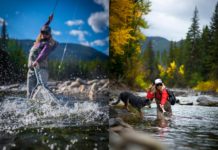Welcome to the latest installment of the Wednesday Wake-Up Call, a roundup of the most pressing conservation issues important to anglers. Working with our friends at Trout Unlimited, Backcountry Hunters & Anglers, the Theodore Roosevelt Conservation Partnership, The Everglades Foundation, Captains for Clean Water, VoteWater.org, and Conservation Hawks (among others), we’ll make sure you’ve got the information you need to understand the issues and form solid opinions.
1. The Fight Over Florida’s Water and Everglades Restoration Continues
We’ve been following the reactions of the conservation and sportfishing communities last month to the introduction of Florida Senate Bill (SB) 2508, which sought to undermine federal control of Lake Okeechobee and threaten the completion of the Everglades Agricultural Area Reservoir–a key component of the plan to send clean fresh water south through the Everglades.
In the face of strong, grassroots opposition—led by The Everglades Foundation, Captains for Clean Water, business owners and hundreds of fishing guides—and the intervention of Gov. Ron DeSantis in February, the worst parts of the bill were amended or removed.
Click here to read the Op-Ed by Everglades Foundation CEO Eric Eikenberg
Click Here to Take Action and Make Your Voice Heard
Related Stories:
• Annual Everglades Update (Thursday, March 10, 2022 at 6:00 PM) is an online opportunity to learn more about the Comprehensive Everglades Restoration Plan (CERP) and critical restoration projects.
• Florida lawmakers are still wrestling with a bill changing Everglades restoration rules, on wusf public media.
• Poll: Floridians overwhelmingly support state — not federal — control of water, on floridapolitics.com.
2. New Mexico Supreme Court Rules in Favor of Public Access to State Waters

Yesterday the New Mexico Supreme Court issued a ruling strongly in support of public access to the state’s waters when it unanimously struck down a regulation allowing landowners to close access to streams running through their properties.
The New Mexico Chapter of BHA, along with the New Mexico Wildlife Federation and the Adobe Whitewater Club of New Mexico, filed suit in 2020 asking the court to nullify the regulation as unconstitutional. Today the court agreed. The decision not only strikes the so-called Non-Navigability Rule from the books; it also voids closures on five New Mexico streams adopted previously.
Click here to read more on backcountryhunters.org
Learn more on fieldandstream.com
3. Why Northwestern Maine could remain an oasis for coldwater fish as their habitat warms

Photo by Sandy Hays
Native, wild brook trout are considered a key indicator species for the health of an ecosystem, the functional equivalent of “the canary in the coal mine.” And that’s why federal, state, tribal and non-governmental organizations are collaborating on a project called the Eastern Brook Trout Joint Venture.
“We all have the primary goal of maintaining thriving fishable wild brook trout populations wherever we can maintain them,” says Merry Gallagher, a native fish conservation biologist with the Maine Department of Inland Fisheries and Wildlife.
The fish thrive in places with robust forest cover and where water stays below about 68 degrees. Gallagher is part of an extensive monitoring network recording temperature changes in gauges placed in hundreds of lakes and streams. That data and modeling by the U.S. Geological Survey show the Rangeley area in western Maine’s Franklin County could become the most resilient to climate warming in northern New England.
Click here to read more on mainepublic.org
Related Stories:
• Alaska worries for its salmon run as climate change warms Arctic waters, on reuters.com
Credit: Source link































